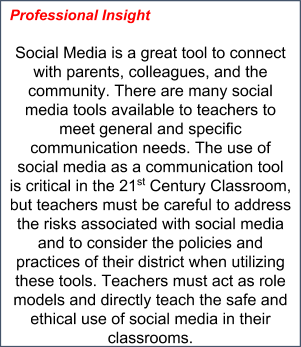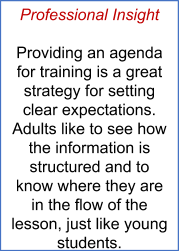 username@email.com
username@email.com
Objectives:
In this workshop you will gain an understanding of:
Leadership skills are an essential part of teaching practice. Teachers must manage classrooms, develop long range plans for their curriculum and manage a budget and set of resources to accomplish that goal. Teachers can also fulfill leadership roles in their schools. Teachers who engage in leadership activities are engaging in professional development for themselves that also impacts the professional growth and experiences of others in the school community. Teachers have opportunities to be grade level and department chairs, instructional coaches, instructional trainers, PLC leaders, participate in building leadership teams, hiring boards, serve on the school council, and lead committees.
Teachers who serve as leaders have the opportunity to discuss and address teacher concerns with other building leaders which has a big impact on the culture and climate of the school. Teachers can be leaders in many different areas and through many different activities. They share a common purpose in that they all act to improve the school community. Even schools with excellent climate and achievement scores rely on teacher leaders to maintain high standards and find opportunities for improvement.
Some core competencies for teacher leaders include:
A well-developed teacher will have a good knowledge of several different effective strategies to use in the classroom. Having a toolbox full of strategies is great, but teachers also need to be able to select the right tool for the job. While many strategies can be effective in a situation, it is often the master teacher who is most successful in choosing the right strategy for a particular lesson for their students. Novice teachers can build skills in selecting the right tool for the job by engaging in reflective practice.
Reflective practice is the process through which a teacher considers and challenges their own practices with an intent to improve. When engaging in reflection, teachers should pay particular attention to issues of equity and bias, intention and action. Intentional reflection on teaching practice adds context to a teacher’s existing knowledge and helps develop a higher level of understanding.
In order to be effective in reflecting on practice, a teacher must be willing to view themselves as a professional that is willing to take risks, that is willing to be flexible, and that is willing and capable of growth. Reflective practice requires teachers to question themselves and to be willing to find room for improvement.
Sample questions for reflective practice:
Connecting with the larger school community can be critical for teachers to be highly effective. In order for students to be successful they must have the support from the family and oftentimes they require support from the community as well. Engaging the community as collaborators in improving the educational outcomes of your students provides additional supports for the students and teachers and provides a real-life context for much of the classroom work. When students are able to see that they are important to the community, their success will more easily follow.
Building a network of support may seem overwhelming, but people in your community want to be involved and they want to help.

Advocacy is an integral part of the teaching and learning process. Teachers must act as advocates for their students, bringing inequities to light and working to level the playing field for all students. Advocacy begins with teachers being intentional about what they say. Avoid being critical of students and families when speaking to community members, and on social media. Be intentional about communicating the inequities and the needs. Be intentional in communicating the importance of education for all students.
Besides advocating for students, teachers should advocate for teachers. Speaking intentionally about the success and impact of the teachers in classroom brings a positive light on the teaching profession. Teachers have the opportunity to communicate positive experiences with members of the community when they are at the grocery store, social engagements, and in any other casual conversations. Advocacy does not require a formal space, a blog, or a conference. Advocacy starts with sharing positive teaching experiences during everyday conversations.
Every post on social media adds to your “brand”. Increase positive and uplifting posts about your work life and avoid negative posts. Not only are negative posts a bad reflection on the profession, but they can negatively impact your professional reputation and impact your attractiveness to potential employers.
Teachers are extremely busy professionals who have little time left over in their day after teaching, planning, grading, and completing paperwork. Any professional development that is required of a teacher must be engaging and worthwhile. As you begin to assume the role of a teacher leader, you are likely to be asked to provide a professional development to a group of teachers. Teaching teachers can be a great opportunity to share your expertise and help your colleagues grow, but care should be taken to design a professional development that will engage adult learners.
There are some different challenges when working with adults. One challenge is that you lose the “authority figure” status that you have when you teach kids. Adults are more critical and less forgiving. They are likely to challenge new information. When working with adults you are not working with a “blank slate” trying to impart knowledge, you are working to change the practices of people with different levels of experience. When we are engaging in professional development we are asking people to change what they are already doing, we aren’t really asking them to learn something new. In order to get someone to change we have to provide good reason and incentive to do so.
Adult learners need relevance. As they challenge new information, they make comparisons to the knowledge and experience they already hold. Adult learners need the opportunity to evaluate the new information if they are going to adopt it into practice. Schedule time in your professional development for your adult students to evaluate information through a writing exercise, or through conversation with a group.
Some accommodations must be made when working with adult learners. Adults have rich lives and responsibilities and it is unreasonable to expect them to keep their cell phones up and ask for permission to go to the restroom. The level of independence of the adult learner requires a different type of classroom management. When you begin a professional development with adults it is important to set clear expectations. Are you planning scheduled bathroom breaks? What’s the cellphone policy? Is the training long enough that it would be worth developing group norms? Adults are usually very cooperative when they know what the expectations are, and when expectations are reasonable.

While some school communities look homogeneous, they usually encompass a diverse student population. Effective teachers display cultural competence. Cultural Competence refers to the teacher’s ability to understand and appropriately respond to students’ and families’ unique cultural variables. Cultural competence refers to factors such as race, ethnicity, gender identity, language, country of origin, religion, and disability. While this list includes a lot of indicators, it is not exhaustive. There is no one book or resource that allows a teacher to become culturally competent. Teachers develop this skill but acquiring knowledge over time, asking questions, and engaging in reflective practice. The most important thing to do to develop cultural competence is to practice intentional reflection on your practice and its implication for different cultures.
The teaching field is in a state of perpetual study. Researchers and practitioners alike are eager to collect data and share information on existing and new strategies for different populations of students. It is critical to the betterment of educational practice for teachers to engage in different types of research and communication in order to advance the field and to improve their own practice.
For full time teachers, the most common type of research is action research. This is research in which the person conducting the research is the one taking the action. You are taking data on your own actions. Action research can be done by an individual teacher or by a collaborating team of teachers. This intent of action research is to improve practice.
You will notice that the process of action research is very similar to the continuous improvement cycle that guides the PLC and the School Improvement process. The desire for ongoing improvement in one’s practice and the success of students is pervasive in education.
Once teachers have engaged in research, it is helpful to share results with others. Sharing information with your PLC and school community is a great start. There are many professional conferences dedicated to teacher presentations on the data collected in their classrooms. Sharing results in these ways develop essential leadership skills and can positively impact teacher performance and evaluation ratings.
How do you approach teaching adults differently than young people?
How are action research and the school improvement process similar?
How can you be an everyday advocate?
How do you build a network of support?
How does reflective practice develop a teacher?
The following is a list of resources that relate to the topic of Teacher Leadership
Barbara, B. and Schrum, L. Every Teacher a Leader. Corwin Press, 2017. Available from Amazon.com
Crowther, F. Developing Teacher Leaders: How Teacher Leadership Enhances Student Success. Corwin Press, 2009. Available from Amazon.com
Gabriel, J. How to Thrive as a Teacher Leader. ASCD, 2015. Available from Amazon.com
Johnson, J. and Leibowitz, S. The Coach Approach to School Leadership: Leading Teachers to Higher Levels of Effectiveness. ASCD, 2017. Available from Amazon.com
Krovetz, M. Collaboratvie Teacher Leadership: How Teachers can Foster Equitable Schools. Available from Amazon.com
Lieberman, A. and Miller, L. Teacher Leadership. Jossey Bass, 2005. Available from Amazon.com
Murphy, J. Connecting Teacher Leadership and School Improvement. Corwin Press, 2005. Available from Amazon.com
Reeves, D. Reframing Teacher Leadership. ASCD, 2011. Available from Amazon.com